The body Richard Armitage is currently occupying, or: Thoughts on Hannibal 3.10 [spoilers]
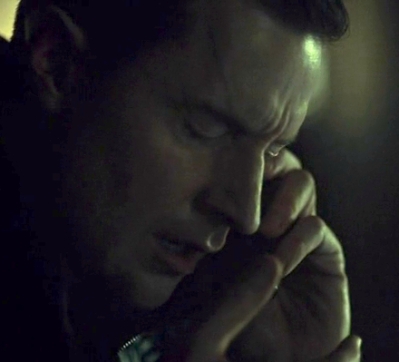
Francis Dolarhyde (Richard Armitage) as he realizes he’s speaking to Hannibal, in Hannibal 3.10. Re-exposed screencap.
I had my usual morning avoidance routine — wanted to watch Hannibal for Richard Armitage and then didn’t want to because of the subject matter, to the point that I spent my lunch hour making event posters and got caught watching it after work by a colleague who loves the show. I, too, loved this episode. After I watched it, I wanted to be alone with my pleasure for quite some time and went out for sushi, as today was also payday!
Getting to the point — I gasped and became teary a few times, and when it was over, realized I’d been transported back to the planet where Richard Armitage is amazing and all’s right with the world, where I remember being the last time in December. This is an ecstatic planet and I want to stay here, although the euphoria makes writing difficult. It helped that only one scene forced me to look away from the screen (the end of Zach Quinto’s therapy session, uch), which made me wonder about the ruling power of my own bourgeois sensibilities. If I could just “get over” the violence, would I enjoy this show? But anyway, it’s really true that I felt free to listen to what the other characters were saying and appreciate the show itself in way that I haven’t since some time in the first season, when I was interested in how the show treats identity issues and had provisionally concluded it wasn’t horror. It helped a lot, in short, that this episode was more a combination of philosophy and suspense than anything else.
We’re still pursuing that question, and I’m still wondering who Dolarhyde is — mentally ill, criminal, what? We spend all this time talking about “becoming,” but what is the significance of that? Is the body we occupy really irrelevant, as Hannibal says and as pleases Dolarhyde so much to hear?
I left the last episode wondering about the role of free will in personal transformation, concluding that Armitage’s performance of Dolarhyde’s desire to change left us on the cusp between will and fate. So personal transformation was in the air for me as a theme, and thus the beginning, where we get to experience the entire conversation between Dolarhyde and Hannibal, offered a fascinating commentary on the act of “becoming” in relationship to the inspiration. It’s interesting that Dolarhyde refers to himself as an “avid fan” of Hannibals, and yes, it might have occurred to you that there could be a significant parallel for me here. I could’ve gushed just like this last August, and it’s amusing to think that maybe Armitage is performing behavior he’s witnessed.
[side note: In a sense, the whole episode is about “fan” relationships with Hannibal — Dolarhyde’s, Will’s, Bedelia’s — and Zach Quinto’s. When Pinto exclaims to Bedelia, “This is culty and weird,” and then begins to choke, one wonders if this is wish fulfillment on the part of the writers against the series’ naysayers. Let’s just make anyone who says “there is an outside” strangle on his own — what? Get mouth-raped by a principal character? Oh, wait.]
Getting back to the scene: The way the camera separates the point-of-view to signify dissociation is really effective, as is the way that Dolarhyde stares at, and responds to, himself in the chair from various points across the room. The way that Armitage mixes Dolarhyde’s shame and humiliation at the way he’s referred to in the press with the pride of the becoming Dragon, who hopes that Hannibal will “meld” with the Dragon’s power, is creepy, and not in an unsubtle way. At one moment, Dolarhyde has dropped his gaze as Hannibal sympathizes with him about the epithet, “Tooth Fairy,” which almost makes me sympathetic to him, and the next he raises his head and expresses his desire for union in a way that makes absolutely crystal clear the way his delusion permeates all his behavior. At one minute I’m sorry for him, at the next I ask myself how I could have thought he was sane just a few seconds earlier.
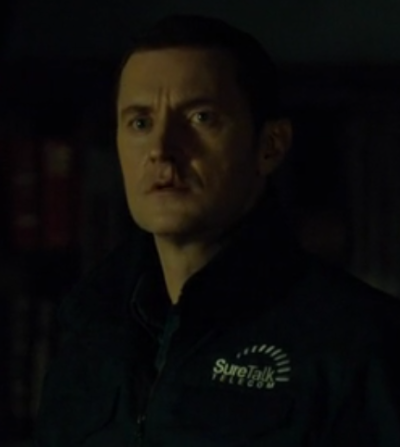
Francis Dolarhyde (Richard Armitage) as we see him glimpse himself as the Red Dragon for the first time, in Hannibal 3.10.
For anyone who’s ever gone to a well- trained therapist (Servetus raises her hand), the scene in this office is truly chilling, as Hannibal does everything the therapist is supposed to do, but as we know, for the purposes of his own pleasure and in order to manipulate Will and draw him back to Hannibal. Throughout, Hannibal offers standard, calm, soothing “unconditional positive regard,” and witnessing the effect of this sentiment as it works on Dolarhyde in turn bolsters my sympathy for him, as I see how he might be if he had anything like a typical form of self-esteem or had ever felt “understood,” which is always the therapist’s first job. It can be truly life-giving to bask in the approval, or at least the understanding, of one’s therapist, to be praised, or at least to be told that one is not as bad or inadequate as one supposes one is. And it’s at this point, as Hannibal urges Dolarhyde to note how magnificent he is, that the observing dissociated Dolarhyde first glimpses himself as he wishes to be: in the form of the actual Red Dragon. The horror of that for the viewer parallels the manipulative way the therapy session works itself out — and instead of comforted, I’m revolted. Pretentious citation of Blake intended to set us up for the zoo notwithstanding, I honestly did not know the script of this show could ever be this good.
Another key point for me here — not only is Armitage’s accent right on point this time, he’s gotten back the resonance that was missing in the previous episode. I’ve been wrestling with this for the last two episodes: is the lack of resonance a characterization mood, to make his speech sound even more strained, or is it a consequence of the fact that he seems to be tightening his face and pulling his jaw down to achieve the American accent? Hugh Dancy does this, too, but it’s also absolutely in consonance with such a tortured character as Will Graham. In any case, Armitage’s got more of his own voice back now, which forces me to ask if it’s just that I don’t find this particular accent all that charming. He’s definitely got the “r” down now — dude, you can back off just a little now.

Detail of background at Bedelia du Maurier’s lecture. I put it in because I think it looks like Richard Armitage a little.
The ensuing lecture that Bedelia gives us is supposed to be a reflection on her experiences in episodes 1-7 of this series, but following on the therapy session it very much underlines the point that we become who we are in significant ways — whether under torture or not — in the eyes, in the estimations of others. The body she thought she inhabited was not her identity, as Hannibal consistently named it differently. Will is not sympathetic, pointing out that we bear personal responsibility for our actions and desires. When they meet, a scene or later, to discuss Hannibal, however, she concedes that she was always a willing participant in hiding Hannibal’s pathologies from others, indeed, that she has a predisposition to this sort of game. Hannibal made her into a monster, but she wanted to be one or was, at least, curious.

Dolarhyde (Richard Armitage) waits to hear whether Reba wants to touch the tiger, in Hannibal 3.10. Screencap.
Cut to the road to the zoo. If Armitage seems a lot like Lucas in the first scene, when he reroutes the phone connections, here, we see echoes of John Standring again. But in this case he’s pushing the whole characterization just enough further that it’s really troubling — one can now imagine what Standring might have been like if he’d been mentally unbalanced and not just frighteningly undeveloped and juvenile. Throughout this episode I wanted better lighting — this must be the most underexposed television show ever — but in this case I thought that it potentially mimicked Reba’s blind perspective on Dolarhyde. If she’d looked at his face while he was waiting for her answer, she would have been seriously troubled. The viscerality of his need for her to agree to pet the tiger, combined with with his fear that she will decline, along with his desire, and his ongoing attempt to hide his illness, slap me across the face for the split second that I see all these things at once. Just when he looks most humiliated, he outs himself as potential predator. My buddy Didion always said that humiliation was Armitage’s best mode, but here I wonder if it isn’t rather that moment where he waits for, expects the humiliation.

Richard Armitage (Francis Dolarhyde) watches Reba’s exploration of the tiger’s pelt, in Hannibal 3.10. Re-exposed screencap.
Guillermo Navarro, Armitage, and Rutina Wesley have already told us what the scene in the zoo is all about: The sedated “tyger” as metaphor for Dolarhyde, Reba touching the tiger and Dolarhyde seeing her, feeling her touching him, Reba intending this and wanting him to feel it, the bigger implication in the room that some kind of affection can tame Dolarhyde’s illness, something it seems at this point that Dolarhyde is at least compartmentalizing, perhaps struggling with. Even though I knew that before I watched it, I still felt the sense of discovery, and this was one of the places where I began to feel teary. Here, I think, for the purposes of sympathy for Dolarhyde, the lighting could have been a bit higher — we lose something when we can’t see all of Dolarhyde’s expressions as Reba strokes the tiger from his side to his ears to his mouth and back again, each part of tiger calling forth a different reaction from Dolarhyde. The darkness makes him look more subterranean, more ill. He looks at her with surprise and apparent incomprehension, glimpsing through her contact with the animal the contours of a world that he doesn’t believe possible for himself. Because of her blindness, though, he can study her like a science experiment, as if she herself were a zoo exhibit behind one-way glass, an examination as chilling as it is heart-breaking. Does Dolarhyde stand that far outside the human race?
Just as I find myself thinking that the music in the zoo scene is sounding an awful lot like an imitation of Debussy, the scene shifts to Claude Debussy’s Arabesque #1, and Reba is making dry martinis in Dolarhyde’s house. Wesley sort of loses her blind girl here, because Reba clearly seems to be maintaining eye contact with Dolarhyde, but it’s enjoyable nonetheless, insofar as we know he can see her beautiful eyes. What’s interesting about this scene, as Reba gets closer and finally asks him if he wants to know what she thinks of how he looks, is that if you look at it in its planned exposure, Dolarhyde looks to be suffering, jerking away from her touch — but if you pause the scene, screencap, and then re-expose so you can see the expression, his reaction is wondering, almost sensual. Armitage performs an interesting layering here around the problem of being touched when you simultaneously want and don’t want to be — and as someone who regularly experiences fear of or revulsion to human touch, this is so unbelievably convincing I almost can’t say in words how affecting I found it. Between Debussy and Armitage’s expressions, I was crying again. Is he pulling away from her or responding to her or accepting her on his own terms? It’s impossible to say. This is a quality that Standring didn’t have, when (excuse me for the raw metaphor) push came to shove — shame at his own arousal, at his inability to remain unmoved — and it’s so hard to watch what ensues. Reba puts her head down near the beating energy of the dragon, and the result is unclear, again due to the lighting. The next thing you know, Fuller will be telling us he doesn’t do oral sex stories.
[Had to switch cafés. This is what happens when you get a late start writing because you’re on planet “Richard Armitage is perfect.” Bye, Starbucks, hello, Perkins.]
Given the almost monstrous way Dolarhyde clomps up the stairs with Reba, one almost thinks one might be about to witness a rape (oh, wait) but instead we get a sort of mildly psychedelic sex scene. That this is serious male fantasy is obvious — good lovers are not born, they practice, and Dolarhyde has never practiced before, as Armitage informed us — but their mutual ecstasy is obvious and it’s a fantasy I’m happy to subscribe to as it’s thankfully brief. We see more of Dolarhyde’s tattoos and his picture of Reba as the woman clothed in sun than either of their bodies, and the climax falls from his face with his tear as he watches her above him. But the killer piece of this chunk of the episode is the interlude when she’s fallen asleep and he’s wakened and he looks at her at his side in bed, and tries to recapture that sensation of being touched. She’s still asleep, and he touches first her breast over heart, then listens to her heart, and then brushes her hand across his face, a sort of mime that recalls the pleasure of the previous scene, then settles back (to sleep) against her side. But when he wakes after a dream of one of his murders, and discovers she’s no longer by his side, he rises, pulls on his underwear — and is transformed instantly back into the big-eyed predator, romping up the stairs to discover her not far from his attic altar. The scene where he stands before the reproduction of the Blake image and switches from one persona to another is again chilling — and it calls forth the twin themes of the voice in one’s head and the inevitability of personal transformation as he switches between the posture of the predator, the crouch of the victim, and the normal posture of the barefoot adult male.
The show moves back to Will and Bedelia, and the question of whether someone can be manipulated to change one’s identity or at least one’s self-perception. Will and Hannibal are then able to look at the Red Dragon’s Chinese character and speculate about the killer; Hannibal pokes Will verbally and Will knows Hannibal is doing it. Then it’s on to the Brooklyn Museum to see the original Blake. (Cool, but by the bye, this is not how you get to see stuff like this. You can’t walk in without credentials and bona fides and references from other scholars, and I suspect very strongly based on my experiences in rare book collections that even most scholarly visitors are not given private viewings with just one overseer.) And finally, we get to see what Dolarhyde apparently does to his victims, as the saber-toothed tiger is now no longer sedated but fully aware. He rubs his face with affection against the artwork, just as Reba rubbed her face on the tiger and he rubbed her hands over his face:
and then he proceeds to consume it.
Remind me never to get between Richard Armitage and his dinner!
Armitage (and Fuller) were at pains, in different ways, to stress how we should view this character — as the participant in a love story, as someone whom we might sympathize or empathize with at times, but who in the end had to be condemned for his vices — but I think I find, to the extent that I am actually drawn into turning over the possibilities of free will, compulsion, art, desire, and morals, that I’m actually (horrors!) taking on Hannibal’s viewpoint. Dolarhyde as Armitage performs him is trying — clumsily, desperately, with an embarrassing, fawning love for his inspiration, with struggles both against his better impulses (the possibility of love) and his delusion, against his conflicting desires and the voices in his head, against his secret knowledge that he will fail, to be a Bordieuian virtuoso and coming up against his limits. He’s a twisted but honest Lebenskünstler. The body that he currently occupies is irrelevant to the activities that he is pursuing — he wants to reject the identity of the disfigured person who is seen, and be the Dragon who astounds everyone with his magnificence. Reba is a problem because on some level she challenges that dichotomy — she cannot see his cleft palate as Dolarhyde, but neither will she see the Dragon in all his glory. She offers an alternative way — a pleasant, loving way — for him to remain unseen.
In the sense that the bodies that we are currently occupying are simultaneously decisive for and irrelevant to our becoming, and insofar as Dolarhyde wrestles hard with this problem in this episode, I can bring myself neither pity nor condemn him. I recognize him as a fellow human, doing the same thing we all do. This is a triumph of Armitage’s performance.

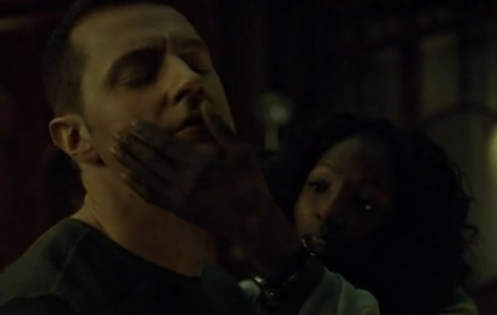
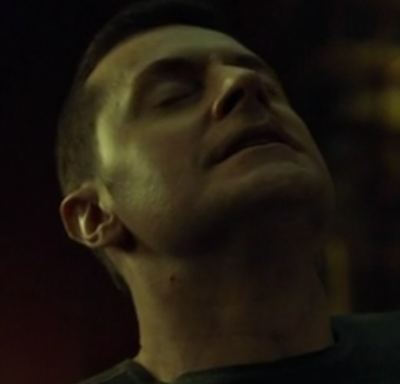
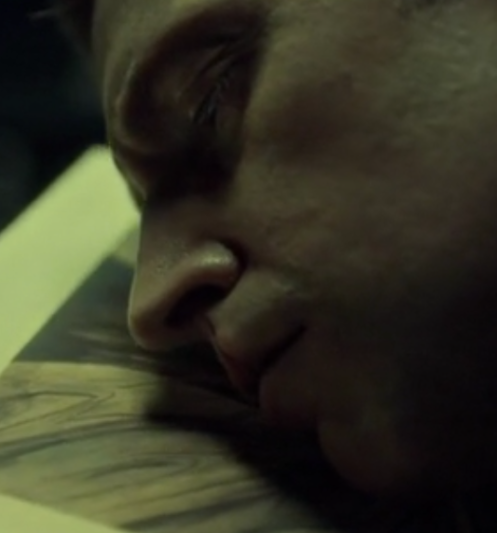
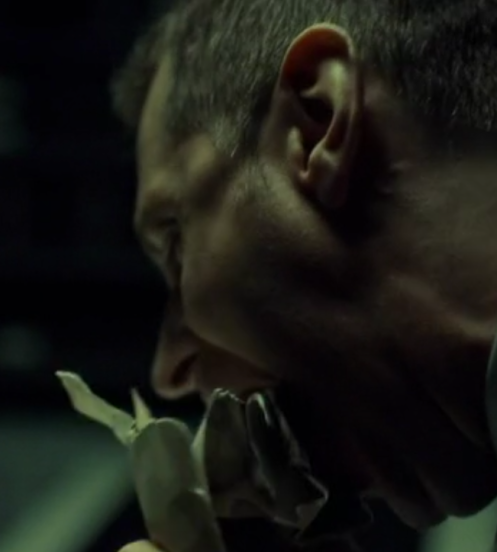



“Good lover are not born, they practise.” Das kam mir auch sofort in den Sinn. Wie wahrscheinlich ist das bei einer seelisch so dermaßen deformierten Person wie FD, der lediglich in Vergewaltigungen (post mortem?) geübt ist, dass er eine Frau so absolut befriedigt? Aber klar, als
Fantasie funktioniert diese Darstellung. Ich finde seinen Gesichtsausdruck auch um Längen besser, als das, was er uns in Spooks geboten hat. Da wirkte er einfach nur bekifft.
“Und the next thing you know, Fuller will be telling us he doesn’t do oral sex stories” LOL Ich bitte dich, sie hat doch bloß den Sitz seiner Hose geprüft und weil sie nichts sieht, musste sie das halt mit den Händen und evtl. mit dem Mund….. hust
Ich fand übrigens den Moment, als er sich Reba schnappt ein wenig hektisch überzeichnet, überhastet. Erinnerte mich an diese uralten Monsterfime, wenn die taumelnde Heldin geschnappt und zwecks Defloration in die Höhle des Ungeheuers verschleppt wird. Mich brachte das eher zum Grinsen.
Insgesamt eine großartige Folge, mit gaaaanz viel zu entdecken.
Danke fürs Aufdröseln und Strukturieren. 🙂
LikeLike
right! She was worried his trousers didn’t fit. Totally understandable.
You’re right about the monster films, although I wonder if he wasn’t sort of living that out.
LikeLike
“Good lovers are not born, they practise”. Das genau kam mir auch in den Sinn. Wie wahrscheinlich ist das bei einer seelisch so dermaßen deformierten Person wie FD, der lediglich in Vergewaltigungen (post mortem?) geübt ist, eine Frau so absolut zu befriedigen? Aber klar, als Fantasie funktioniert diese Darstellung. Mir gefällt sein Gesichtsausdruck dabei auch um Längen besser, als das, was er uns in Spooks angeboten hat. Da wirkte er einfach nur bekifft.
“And the next thing you know, Fuller will be telling us he doesn’t do oral sex stories” LOL. Ich bitte dich, sie hat doch bloß den Sitz seiner Hose geprüft und weil sie blind ist, musste sie das halt mit den Händen und dem Mund….. hust
Ich fand übrigens den Moment, als er sich Reba schnappt einwenig überhastet gefilmt und hektisch überzeichnet. Erinnerte mich an diese uralten Stummfilme, wenn die taumelnde Heldinn vom Monster gepackt und zwecks Defloration in die Höhle verschleppt wird. Mich brachte die Darstellung eher zum Grinsen.
Insgesamt eine großartige Folge, mit gaaanz viel zu entdecken. Danke fürs Aufdröseln und Strukturieren 🙂
LikeLike
There’s also the plot problem that typically people who have a paraphilia don’t derive enjoyment from plain old sexual intercourse — that’s kind of the definition of a paraphilia.
LikeLike
äh, da sind ja meine diversen Versuche. Jetzt kannst du meinen “kreativen” Prozess beobachten, wenn Kommentare ständig umformuliert werden. Hättest ruhig einen rausnehmen können. Sieht ein wenig übereifrig aus. Und dann noch per Mail, Himmel….. 😉
LikeLike
I always enjoy hearing from you 🙂
LikeLike
Du bist so nett in deiner grenzenlosen Geduld 😉
LikeLike
I agree with you on all of this. Whole episode was as one was witnessing slow motion tennis match (so to say) – each scene (hit, stroke) bringing different emotions: chill, force, vulnerable side, power, creeps, shame, tenderness, repulsiveness, empathy… Even now, just remembering from yesterday, it gives me goosebumps. And Armitage is really stunning in this role.
LikeLike
Yeah, he really knocked it out of the ballpark in this episode. It’s definitely going in the “essential watch” category for his career.
LikeLike
Yes, yes, yes! I have more to say, too. I’ve had a small taste of the thrill of Armitage in each of the first two episodes so far, but this episode was manna from heaven, so much so that I hardly know where to start. I watched it at lunch yesterday and then immediately re-watched it in its entirety because the whole episode was good for once, and felt almost exhilarated and completely overwhelmed. It was, in that sense, almost like viewing The Crucible the first time, when I was so overwhelmed with all the impressions and nuances that it was hard for me to specify any one impression because there were simply too many amazing moments. Great review!
LikeLike
yes — agree re comparison w/The Crucible.
(and I can’t believe someone cast Ben Whishaw as John Proctor. Whishaw is talented — but a powerful farmer? Nah.)
LikeLike
I really enjoyed this recap, and I also thought the episode was enthralling. I was incredibly moved by the tiger scene.
I had one different impression from you. When FD wakes up next to Reba, I thought either he was checking to see if she was still alive, or else at the very least the storytellers were making the viewers wonder whether she was still alive. In fact, if the purpose was the latter, then it was ambiguous up until he sees her downstairs and she tells him she is ready to go.
LikeLike
I think (anyway) that I am allowing myself to watch the show being aware of what happened in the book, so it didn’t occur to me that she could be dead at this point. I was fixated on the notion that he couldn’t let her touch his face when she was awake, but craved it when he didn’t have to face her in reality.
LikeLike
Wow, fabulous review, Serv, now that I have finally read it. “he wants to reject the identity of the disfigured person who is seen, and be the Dragon who astounds everyone with his magnificence.” That’s FD in a nutshell and the premise of the show – much in contrast to what I as a lovey-dovey non-horror fangirl want to see. Your observation about FD’s face when he tries to evade Reba’s touch is spot on. I am actually amazed that it is possible to act something like that, consciously. Or maybe it is that heightened sense of empathy that Armitage seems to have, to involuntarily just act the right way. It adds so much to the a scene – well, for those who manage to catch it. It all happens so quickly, I sometimes think that it’s almost wasted on the moment.
Very glad, btw, to hear that you have (momentarily?) found yourself back on “RA is perfect” planet. I hope you enjoy it – draw it out? hold on to it? Let’s hope Armitage maintains his silence – that would make it easier 😉 (just kidding).
LikeLike
He’s like a carpenter who makes all the hidden joints perfect even though they will never be seen, or those people who put the figures on the uppermost level of the Prague Cathedral, where no human would ever see them, but only G-d.
LikeLike
That is such a beautiful simile, Serv. Yes, he is. And he goes above and beyond what is needed, always giving the maximum. The comparison with the artists who decorated the cathedral is apt – in the sense that he does it for art’s sake.
LikeLike
hach so great reading everyone’s thoughts after managing own ourpourings 😉 It is like reliving it again and again and discovering new things every time. Astounding all that emotional complexity he displays, no? And that switching between and blending of man&beast…
I really agree with Dancy’s description of the series as ‘dark fairy tales’ but it has to be acted this well for the tale to be good and for us to be able to really indulge in the fantasy.. or nightmare 😉
As to the phycho chats i have to confess i am a bit over them. I am fed up with 3 series of seeing and hearing Hannibal viciously enable his patients mentally down the path to destruction rather than balance and the enjoying the results. And all the religious references, sigh pulheezeee… I know it is the books and all that but the stick is getting old after all these episodes, i just don’t have much patience left for it. i essentially blended H mentally in the background and just focused on D. I am equally over Bedelia too, but i was that in Florence already, she’s as bad as Hannibal, just not as bold in enjoying or pursuing the same tendencies. I enjoyed Will telling her like it is 🙂 I blended out the death of the patient as soon as he started choking as my reaction was : oh, come ooon! Yes they are new variants of crime and so on and twisty bendy mental abuse but at this point it all feels like deja vu to me.
The rest was fa-bu-lous! And i think D discovered that there is so much more to sensuality than climax and that is where the amazement comes from 🙂 But of course same things triggered similar reactions of tenderness and fear for me as everyone has already described 🙂
LikeLike
I’ve been more interested in the therapy episodes when it’s been Hannibal / Will — on the whole, yeah, the manipulation of the “murderer of the week” has been less interesting. I’ve spent a lot of time in therapy since 2009 and it’s interesting to me because of that — that these people don’t see through what’s going on. When therapy is good (reflections on the nature of existence), it can be very good / interesting, and occasionally the Will / Hannibal encounters get there. I just find myself unable to think about them because I’m shaking my head too hard to get the awful pictures out of my head.
LikeLiked by 1 person